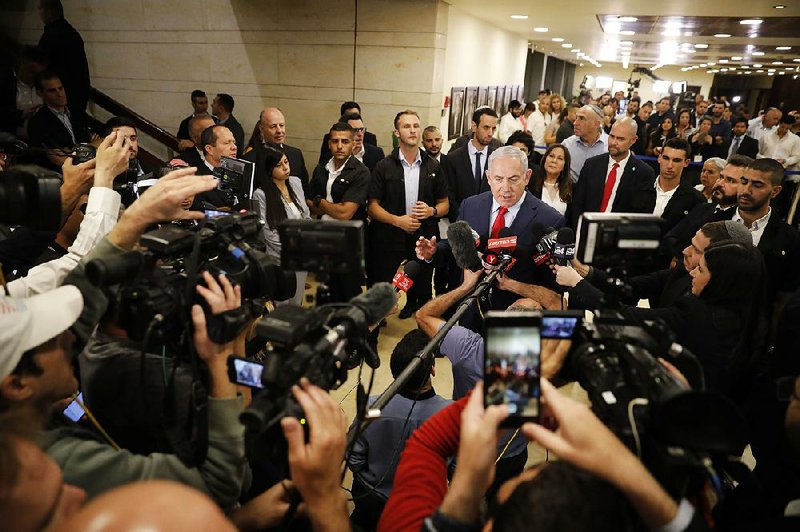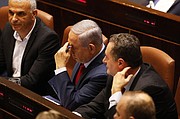JERUSALEM -- Israel's parliament voted to dissolve itself late Wednesday, sending the country to a second election this year as Prime Minister Benjamin Netanyahu failed to form a governing coalition before a midnight deadline.
The vote, less than two months after the first parliamentary election, marked a downturn for Netanyahu and throws the longtime leader's future into question.
Netanyahu, who has led Israel for the past decade, had appeared to capture a fourth consecutive term in April's election.
But infighting among his allies and disagreements over proposed bills that would protect Netanyahu from prosecution stymied his efforts to put together a majority coalition.
Rather than concede that task to one of his rivals, Netanyahu's Likud party advanced a bill to dissolve parliament and send the country to the polls for a second time this year.
Had the deadline passed, Israel's president would have given another lawmaker, most likely opposition leader Benny Gantz, an opportunity to put together a coalition. After the vote, Gantz accused Netanyahu of choosing self-preservation over allowing the country's political process to run its course.
Gantz said that instead of following procedure, Netanyahu opted for "three crazy months" of a new campaign and millions of wasted dollars over a new election because he is "legally incapacitated" by looming indictments.
"There is no other reason," Gantz said.
Netanyahu's Likud party won 35 seats in the April 9 election, and his religious and nationalist allies won another 30, appearing to give him a solid majority in the 120-seat parliament.
But discord between his ultra-Orthodox allies and former Defense Minister Avigdor Lieberman's secular nationalist Yisrael Beitenu party resulted in a deadlock.
At the core of the political crisis was a sharp disagreement over legislation to replace a military draft law that exempted ultra-Orthodox men. Israel's Supreme Court has set a deadline of late July to replace the draft law.
Lieberman has insisted that new legislation that would set modest quotas for enlisting ultra-Orthodox men must pass without alteration. The religious parties, which have 16 parliamentary seats, insist it must be softened.
The issue of unequal conscription has long roiled Israeli society and politics. Most Jewish 18-year-olds are drafted for more than two years.
But Lieberman has also said that the military draft law is just a "symptom" of a broader battle over the character of the country.
After the vote, Netanyahu accused Lieberman of making unrealistic demands and forcing an unnecessary election.
"He is dragging the entire country for another half a year of elections," he said.
In a Facebook post late Tuesday, Lieberman denied that he was involved in any personal "vendetta" against Netanyahu or was seeking to topple him, as some Likud officials had suggested.
He wrote: "I am for the state of Israel, I am for a Jewish state, but I am against a state based on Jewish religious law."
Wednesday's vote sends the country into uncharted political waters, no less because Netanyahu, the interim prime minister, still faces the possibility of an indictment on corruption charges around the time of the next election.
Information for this article was contributed by Josef Federman and Ilan Ben Zion of The Associated Press; and by Isabel Kershner of The New York Times.
A Section on 05/30/2019

